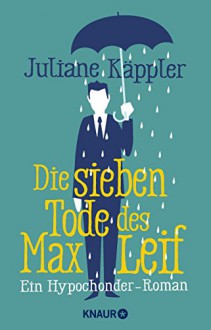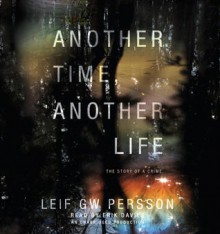
Max Leif ist grade mal 41 als ihm ein Herzinfarkt ereilt und ihm einen Denkzettel verpasst. Auch sein bester Freund Paul redet auf ihn ein und macht ihm klar das es vielleicht nicht so gut ist sein Leben nur auf der Überholspur zu verleben. Das er auch mal an sich denken soll, und Arbeit nicht alles ist was einen Sinn im Leben bringt. So überredet Paul Max also dazu, eine Woche mit ihm in die Ferien zu gehen, sich auszuspannen, sich zu erholen, es sich einfach mal gut gehen lassen. Doch wie das Leben, diese Schlappe nun mal ist, macht sie den beiden einen gewaltigen Strich durch die Rechnung! Denn Paul stirbt überraschenderweise an einer Lungenembolie in folge einer Thrombose, und das kurz vor dem Urlaub mit Max. Trotz allem geht max nach Sansibar, überlebt mehr den Urlaub als was anderes, und kommt nach einer Woche wieder völlig fertig nach Hause, doch nichts ist mehr wie es war denn wie es scheint steht auch sein Tod unmittelbar bevor.
Die Geschichte
Juliane Kuppler hat sich mit diesem Roman über einen Hypochonder wirklich in mein herz geschrieben. Die Idee war für mich neu, denn ich hab noch nie einen Roman über diese Störung gelesen weder als witzige Geschichte noch als Drama. Und ich finde, die Umsetzung ist ihr mehr als gut gelungen!
Die Geschichte ist total nachvollziehbar und man kann mir auch sehr gut vorstellen wie solch ein Erlebnis jemanden so aus der Bahn werfe kann das es zu einer solche Störung kommt. Man muss sich nur der Komplexität im klaren sein. Das Buch, oder eher Max Leif, konnte mich von den ersten Seiten an mitreissen. Er hat mir an seinem Leben teilhaben lassen, ich lachte mit ihm, nicht über ihn, ich hatte Mitgefühl, kein Mitleid, ich freut mich für ihn genau so wie ich mit ihm verzweifelt war. Von der ersten Seite bis zu letzten hat er mich nicht los gelassen.
Der Schreibstil von Frau Käppler ist flüssig, witzig, direkt. Es macht Spass durch die Seiten, das Leben von Max zu rauschen. Das Buch ist in 7 Monate aufgeteilt, jeder Monat für einen Tod. Diese Kaputte wurden auch wieder in Subkapitel eingeteilt die mit passenden Übertitel versehen wurden. Und ich finde das wirklich sehr passend zur Geschichte. Auch von der Stimmung war alles dabei von besorge, über liebevolle und auch ärgerliche und verzweifelten Momenten war alles mit dabei.
Was das Ende angeht, ich war mehr als zufrieden. Zu viel möchte ich dazu eigentlich nicht sagen aber es ist ein passender Abschluss.
Am nächsten morgen halt ich am Krankenhaus, um zu sehen , ob es Paul inzwischen gut genug ginge, um doch mitfliegen zu können. Da war er schon eine Stunde tot. Nicht mehr am Leben! Von einem Tag auf den anderen. Eben noch im Meeting. Jetzt schon tot. Nicht.Mehr.Da.
S.11 – Max
Prota- und Antagonisten & Co
Klar, der Protagonist ist Max, den um seine 6 Monate nach der Reise geht es. Max ist mir sofort ans Herz gewachsen und ich kann ihn Förmlich vor mir sehen. Ich kann mir zwar gut vorstellen das manche ihn als nervig empfinden könnten, was aber bei mir nie der Fall war. Er ist ein überaus herzlicher und grosszügiger Mensch, der einfach grade in einer absoluten Kreise steckt. Angst vor dem Tod hat, was eigentlich so nicht mal stimmt, nur oberflächlich gesehen denn die Angst vor dem Tod ist eigentlich mehr die Angst vor dem Leben.
Max kämpft sich durch die Tage, Wochen und Monate. Doch er lernt auch viel über sich selber und gibt ein geheimes Preis und wächst doch noch über sich hinaus, was ich einfach toll finde.
Juliane Käppler schafft es nicht nur die Emotionen glaubhaft rüber zu bringen sondern auch in mir Emotionen zu wecken. Und das gelingt nicht wirklich jedem Autor.
Klar erfahren wir in der Geschichte ein klein bisschen mehr von Max und diese Häppchen die uns die Autorin zu lesen gibt, reichen aus um uns klar zu werden was in Max ausläuft und warum er manches tut und warum er schlussendlich in diese Krise gerät.
Neben Max gibts noch ein paar wenige Nebenfiguren die aber im leben von Max eine ganz wichtig Rolle spielen.
Da wäre seine russische Putzfrau Jekatarina Poljakow. Eine resolute aber sehr sympathische Frau, die Max auch mal die Meinung geigt. Sie ist mir eben so ans Herzgewachsen wie Max.
Dann haben wir noch Floh, sein Ex-Angestelter. Frau Dr. Bärbeisser, sie bekommt öfters mal das vergnügen sich um Max zu kümmern und Maja… eine verletzliche aber herzliche, ein ach manchmal kratzbürstige Frau, die aber ein grosses Herz hat welches sie zu beschützen weiss. Und die Eltern von Max. Die mir am Schluss dann doch noch sympathisch werden
„Haben Sie eben tatsächlich das Fenster geputzt, oder hab ich mir das eingebildet?“, fragte ich, weil ich mir vor Verlegenheit nichts anderes einfällt. „Konntest du schreiben Sau darauf“, antwortet sie mit leichtem trotz in der Stimme. „Chabe ich angeschaut zwei Tage und heute Lappen und Seife gebracht mit.“ Sie beugt sich näher zu mir und tätschelt meinen Arm etwas kräftiger. „Freue ich mich so, dass du wach bist, Max Leif. Chast du uns alle gejagt grossen Schreck! Haben wir in Zeitung gelesen, was passiert ist. War Foto drin mit Auto, das in Schild gesteckt.“
S. 345 Max / Jekaterina
Die Sache mit dem Text
Wer die letzten 3 remis hier schon gelesen hat weiss das ich hier noch mit einem anderen Aspekt heran geht. Durch meine Legasthenie, bekommt die Sache mit dem Text eben noch ne andere Komponente, die hier immer Beachtung finden wird.
Der Text ist dem Genre angepasst, die Kapitel sind gut von der Länge, so das es immer spannend bleibt und dennoch einen guten und schnellen Lesefluss erzeugt und ich finde das die Länge der Kapitel sehr angenehm ist.
Das Buch ist im Blocksatz gedruckt was ich sehr angenehm finde, denn es macht s einfacher die Zeile nicht zu verlieren, also für mich. Mag bei anderen Legastheniker vielleicht etwas anders sein. Aber das ganze scheint Fach etwas ruhiger und aufgeräumter und das macht das lesen etwas entspannter. Die Grösse der Schrift ist auch okay. Auch wenn ich mir manchmal doch eine etwas klarere Schrift wünsche.
So ein Hirntumor kann man sah sicher operativ entfernen. Vor ein paar Monaten hab ich zwar gesagt, dass niemand an mir rumschnippelt, aber wenn es um einen Tumor im Kopf geht, sieht das natürlich anders aus. Der muss auf jeden Fall raus. Der zahlt keine Miete. Selbst wenn ich dabei drauf gehe. Ich will gesund sein oder sterben bei dem Versuch, es zuwenden.
S. 203 – Max
Und sonst noch
Das Cover find ich toll, Max der im Regen steht. Irgendwie völlig sinnbildlich für die ganze Kreise. Auch der Titel find ich sehr passend, denn 7 mal hätte es ja sein könne das er stirbt, bis…
Das Buch ist mein erstes Highlight dieses Jahr und ich bin wirklich sehr begeistert von diesem Buch. Es konnte mich berühren, und das auf eine ganz spezielle Weise. Das Buch schaffe es sich mal genauer mit der Thematik auseinander zu setzen, sich selber mal zu reflektieren. Denn es ist wirklich kein einfaches Thema und für den betroffenen muss so eine Neigung wirklich sehr anstrengend sein. Kaum ist man was, denkt man gleich man könnte sterben, es ist ein Auf und Ab von Gefühlen. Und das ist bestimmt ein sehr nervenaufreibendes Leben. Also ja, das Buch konnte mich bis zur letzten Seite fesseln.
Die Autorin konnte mich mit der Geschichte um Max überzeugen und ich bin sehr gespannt wie der 2. Teil ist, den ich natürlich umbedingt haben muss!
Wer gerne witzige Bücher mag, die aber dennoch einen ernsten Hintergrund haben, dem kann ich dieses Buch wärmstens empfehlen. Lasst Max in euer Leben und erfahrt wie es ist, immer am Rande des Todes zu stehen.


 Log in with Facebook
Log in with Facebook 








